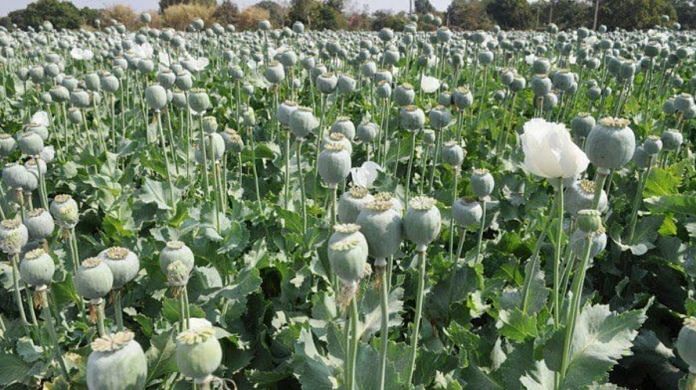New Delhi: Poppy farmers across the country are a distressed lot in more ways than one.
First, the lockdown has prevented them from selling opium to the government’s narcotics department — a mandatory requirement under the Narcotic Drugs and Psychotropic Substances Act.
Every year in April, the narcotics department procures opium from farmers. However, this time due to the lockdown, opium has been lying in the homes of farmers for more than a month now.
Second, and more importantly, farmers are worried that keeping the opium in their homes/godowns for a long period could lead to deterioration in their quality, affecting its net weight. This could also result in poppy cultivators losing their license, farmers in Madhya Pradesh and Rajasthan told ThePrint.
According to the licensing policy, if the net weight of the opium produce is less than the per hectare norm mandated by the government when it gives opium licence, then the farmer could end up losing their opium cultivation licence.
The policy states that only those farmers who will sell the opium produce of not less than 53 kg/hectare in Madhya Pradesh and Rajasthan, and an average yield of not less than 45 kg/hectare in Uttar Pradesh, will be eligible for the licence. This is the minimum qualifying yield fixed by the government for farmers in these states while allotting licences to poppy cultivators.
Also read: Coronavirus lockdown has given us a blank slate. We can write a new world when it lifts
2 of nine opium factories operating in MP
Manohar Lal, a poppy farmer from Mandsaur in MP, told ThePrint, “The poppy harvest is drying up in our houses. Opium is losing weight and every farmer is afraid that their opium licence might get cancelled. We have to keep a check on it every day — both to safeguard its quality and quantity. Ensuring the security of the produce is also a concern.”
Lal said that every year the weighing of opium used to be completed by 20 April by the narcotics department, but it has not happened this year because of the lockdown.
An official in the Narcotics Control Bureau, Mandsaur, sub-zone, told ThePrint on condition of anonymity that only two out of the nine government opium and alkaloid factories in Madhya Pradesh are currently operating.
Besides, most of the security guards who kept a watch on the manufacturing process and prevented smuggling of the processed opium are not coming to work because of the lockdown.
“If there are not enough security personnel to run the factory, then there is no point of procuring from the farmers. Also, the government has not issued any order for purchasing opium to us yet,” the official said.
No compensation
India is one of the largest legal producers of opium along with Afghanistan and Myanmar.
Opium is also used to make medications such as morphine, codeine and thebaine. Most of these by-products of opium are either consumed domestically or exported for medicinal use.
There are over one lakh poppy farmers in Madhya Pradesh, Uttar Pradesh and Rajasthan.
Most of the farmers said the harvest of opium had been completed a month ago.
In Rajasthan, opium cultivation is practised in Jhalawar, Bhilwara, Udaipur, Kota, Chittorgarh and Pratapgarh districts. Opium farmers in Rajasthan are already contemplating abandoning poppy cultivation due to apathy of both central and state governments.
“We are yet to receive the compensation of the damage caused by the unseasonal hailstorm this year, which damaged the bud in the poppy crop and is threatening the harvest yield. The state government has not done any damage assessment of our fields so far,” Ramnarayan Bijarniya, a poppy farmer from Chittorgarh district, told ThePrint.
Bijarniya added that despite braving all odds, the farmers in the state have managed to produce a decent amount of opium this year, but now the central government is not procuring it.
Avinash Chand Meena, a poppy farmer from Pratapgarh, complained about the rate offered by the government for opium procurement.
“We get Rs 1,000/kg opium whereas, in the black market, it costs Rs 50,000/kg. There are more risks and efforts involved in opium farming as compared to other crops. So, we should be paid at least Rs 10,000/kg but this government is not even procuring our produce at the earlier price,” he added.
Also read: Job losses, pay cuts, editions shut — coronavirus triggers new crisis for Indian media
Opium-addicted parrots wreaking havoc
The delay in procurement of opium produce is not the only problem that is plaguing the poppy farmers. Adding to their owes is the havoc created by opium-addicted parrots.
Farmers complain that parrots addicted to opium take turns to destroy their crops despite multiple attempts of scaring them away. In addition to the poppy crop, the parrots tear apart poppy seed pods to get to the opium inside.
“One poppy bud produces 30-35 grams of opium, which is destroyed by large groups of parrots during the harvest season as some of them even fly away with pods,” said Gopal Sahu, a poppy farmer from Neemuch in Madhya Pradesh.
These parrots have become addicted to the crop as they return to the field 30-40 times a day and feed on the morphine oozing out of the bud after we split the poppy buds to help them ripe, added Sahu.
He said that farmers have been complaining about parrots for over years now to the authorities, but to no avail.
Also read: India lost more jobs due to coronavirus lockdown than US did during Depression




In India we have only 2 plants not 9 so please check once against from your source.